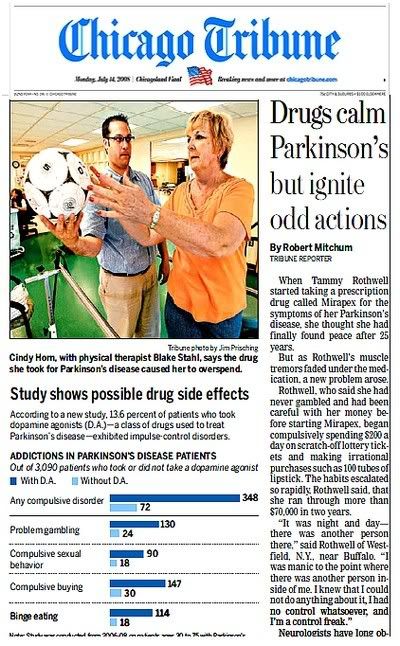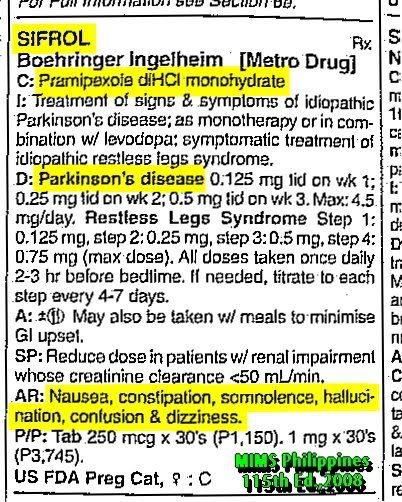
Pramipexole is known more by its brand names Mirapex or Sifrol, and is used to treat Parkinson's Disease.

As explained in the Chicago Tribune story, Mirapex or Sifrol helps lessen the tremors brought about by Parkinson's. But there is a huge trade-off in some drug users --- unusual adverse effects. These unusual adverse effects are seldom mentioned, even in doctor's drug info books (see the image above taken from the Philippines' MIMS, our version of the PDR).
One unusual adverse effect is compulsive gambling.
Drug manufacturers, of course, will reason out that the people affected comprise only a minority of the total number of people who take the medication.
Choosing the right medication for patients can be a difficult task for doctors, especially in cases when there are unusual side effects. It is almost certain that the affected patient will complain about these unwanted effects on their next visit.
Each patient behaves and reacts uniquely to medications. Scientific data always pepper us with statistical percentages in the hope that we become more informed, but in actual practice, it is really more of a burden. The challenge is to never run of ways of being creative in tailoring our treatment options.

As explained in the Chicago Tribune story, Mirapex or Sifrol helps lessen the tremors brought about by Parkinson's. But there is a huge trade-off in some drug users --- unusual adverse effects. These unusual adverse effects are seldom mentioned, even in doctor's drug info books (see the image above taken from the Philippines' MIMS, our version of the PDR).
One unusual adverse effect is compulsive gambling.
Rothwell, who said she had never gambled and had been careful with her money before starting Mirapex, began compulsively spending $200 a day on scratch-off lottery tickets and making irrational purchases such as 100 tubes of lipstick. The habits escalated so rapidly, Rothwell said, that she ran through more than $70,000 in two years.
"It was night and day—there was another person there," said Rothwell of Westfield, N.Y., near Buffalo. "I was manic to the point where there was another person inside of me. I knew that I could not do anything about it, I had no control whatsoever, and I'm a control freak." [Chicago Tribune]
Drug manufacturers, of course, will reason out that the people affected comprise only a minority of the total number of people who take the medication.
Neurologists have long observed dramatic changes in the behavior of patients receiving treatment for Parkinson's disease, with some developing gambling problems, heightened sexual interest or compulsive spending and eating habits where there had previously been no sign of such disorders.
Now, the largest study ever conducted on the phenomenon has found that more than 13 percent of patients taking a particular class of drug called dopamine agonists, sold under brand names including Mirapex and Requip, suffer from at least one of four serious behavioral addictions. [Chicago Tribune]
Choosing the right medication for patients can be a difficult task for doctors, especially in cases when there are unusual side effects. It is almost certain that the affected patient will complain about these unwanted effects on their next visit.
Each patient behaves and reacts uniquely to medications. Scientific data always pepper us with statistical percentages in the hope that we become more informed, but in actual practice, it is really more of a burden. The challenge is to never run of ways of being creative in tailoring our treatment options.